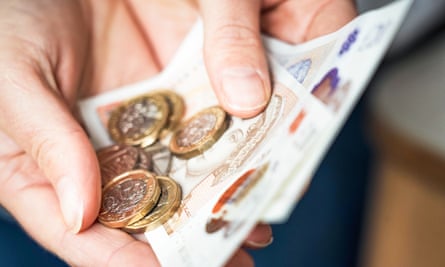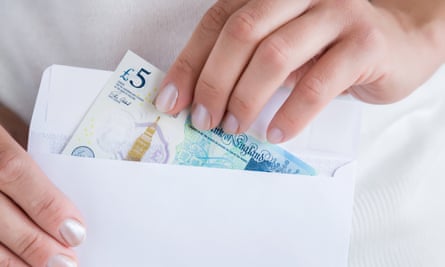A year ago, buying a Starbucks coffee didn’t feel “real” to Samantha Thomas. “It was just tapping,” the 41-year-old private tutor from Wigan says. “It didn’t feel like real money, it was just my card.” Nowadays, Thomas pulls out a £5 note every time she wants a hot drink. “When you’re physically handing over solid money,” she says, “it just makes you think twice.”
For the last 12 months, Thomas has been a cash-only consumer. She leaves her debit card at home when she does her weekly food shop, bringing only the budget she has allocated in notes. As a result, Thomas could “sit here and tell you to the penny” what most items in the supermarket cost. “I know that if I go to Aldi something would cost me 6p less than if I went to Asda and about 5p less than if I went to Tesco,” she says. Thomas’s “solid money” habit hasn’t just changed her attitude to Starbucks; it’s changed the way she spends and saves entirely.
 View image in fullscreenResearch shows that we experience the ‘pain of paying’ when spending cash. Photograph: georgeclerk/Getty Images/iStockphoto
View image in fullscreenResearch shows that we experience the ‘pain of paying’ when spending cash. Photograph: georgeclerk/Getty Images/iStockphoto
Thomas is not the only one turning to cash during the cost of living crisis. In July, more than £800m in banknotes was withdrawn from Post Office counters, a 20% rise from the same month the year before. Martin Kearsley, banking director at the Post Office, told the BBC: “We’re seeing more and more people increasingly reliant on cash as the tried-and-tested way to manage a budget.”
Since records began five years ago, Post Office withdrawals have exceeded £800m only once before – and that was last Christmas, a time when a lot of cash is tucked into cards. Shortly after UK wages fell at their fastest rate in 20 years, Kearsley said it was clear that Britain is “anything but a cashless society”.
Thomas first ditched her debit card post-lockdown after she was troubled by her online spending during the pandemic, but she says her cash-only budget is helping her to prepare for rising costs. “I feel like I’m ahead of the game, I feel like I’ve got an advantage,” she says. “It’s definitely going to be tricky, but I feel like I’ve already got lots of tools in place to help me.”
Contactless promotes increased spending and increased use of debtWarwick business school
Personal finance and consumer expert Sue Hayward concurs that “handing over cold hard cash often makes you think twice about how much you’re spending”. She also notes that it’s easier to keep track of purchases when paying with banknotes, “as contactless payments can take several days to show up on your statement”.
In 2020, researchers from Warwick business school analysed more than 300m transactions from 260,000 consumers and found that people with contactless cards spent “significantly more” than those without. Contactless spenders were also more likely to be charged overdraft fees and made more purchases overall. The researchers concluded that contactless: “promotes increased spending and can promote decreased cash usage and increased use of debt.”
Conversely, almost 30 years of academic research have shown that we experience the “pain of paying” when spending cash: handing over money feels like losing it, activating the insular cortex, the part of our brain that deals with physical pain. (Interestingly, it seems that some alternatives to cash are less painful than others. One 2018 paper, from the Frankfurt School of Finance & Management, found that consumers feel lower levels of pain when they pay with mobile phones and smartwatches than when they use credit cards.)
“It’s just being savvy and going back to old-school ways,” Thomas says of her cash use. On her YouTube channel, The Budget Mum UK, she shows her 2,600 subscribers how she withdraws her wage at the start of the month and separates the notes into different laminated envelopes. Among others, there’s an envelope for food shopping, one for travel, one for credit card debt and one for emergencies.
 View image in fullscreenOld-style budgeting … ‘cash stuffing’ involves setting aside money in envelopes, one for each expense. Photograph: FotoDuets/Getty Images/iStockphoto
View image in fullscreenOld-style budgeting … ‘cash stuffing’ involves setting aside money in envelopes, one for each expense. Photograph: FotoDuets/Getty Images/iStockphoto
On social media, this budgeting technique is called “cash stuffing”: the envelopes help people keep track of their spending and saving without complicated spreadsheets. Google searches for the technique spiked at the beginning of the year, and TikTok videos hashtagged #cashstuffing have now accumulated almost 550m views.
Jade Edmondson is a 29-year-old teaching assistant from Coventry who sells cash-stuffing materials such as labelled plastic envelopes, binders and savings tracking sheets on her Etsy page. She says she has seen a recent rise in sales. In total, Edmondson personally uses 30 cash-stuffing envelopes for things such as petrol money, Christmas savings and her Slimming World membership. Putting away money gradually in one envelope over the course of the year helps Edmondson save for bigger costs: she now has £350 saved to buy her four children’s school uniforms. “If this was me last year, I would be panicking: ‘How am I going to pay for all of this?’” she says. “Whereas actually now, I don’t worry about money.”
Yet a cash-only lifestyle can cause problems in an increasingly cashless society. In 2010, half of the UK’s transactional payments were made in cash, but by 2020, this had dropped to just 17%. A number of shops banned cash payments for public health reasons during the pandemic, but a 2021 survey by Which? found that one in five consumers had been prevented from making a cash payment between April and July of 2021, when restrictions were easing.
The reality is you will pay more using cash because you can’t shop onlineNatalie Cenney
Thomas has run into trouble when paying for petrol – and when she sent her daughter to the cinema with cash recently, she was unable to buy her ticket and snacks. “It’s just been trial and error,” she says. Six weeks ago, she decided to set up Apple Pay on her phone as a backup for emergencies, but she refuses to leave her credit card in her car to avoid temptation.
Natalie Ceeney, chair of the Cash Action Group, says many small businesses don’t accept cash because it’s increasingly difficult to deposit takings due to the closure of high street banks. Ceeney is now campaigning to get ATMs to take cash deposits (you can currently do this inside banks, but opening hours can be prohibitive). However, she says, “setting up a whole new network” is “not quick”. Meanwhile, Ceeney notes that many consumers depend on cash due to “some form of vulnerability”, such as not having a proper internet connection, smartphone or bank account, or having a disability. A May study by the Royal Society of Arts found that 15 million people in the UK rely on cash to budget.
“The main reason people will tell you they use cash is for budgeting: you can see it, you can feel it,” Ceeney says. “With the cost of living crisis, more people are strapped for cash so it shouldn’t be a surprise that people are going back to using cash, withdrawing money to get through the week safely without getting overdrawn.”
Appy shoppers: are the new money-making services worth it?Read more
Although cash can have its advantages, Ceeney warns that there’s a “poverty premium” when avoiding cards. “The reality is, if you can’t shop online you will pay more using cash because you can’t get online deals or direct debits where you often get a discount, you can’t shop around or buy in bulk,” she says. Ceeney explains that although many families know this, they’re “going back to cash because they can’t afford to go overdrawn – this is about necessity”.
Even with cash-stuffing systems in place, Thomas and Edmondson are concerned about the ever-increasing cost of living. “I feel like it’s going to be a big hurdle,” Thomas says of rising bills, while Edmondson adds: “It’s still very nerve-racking. It’s like: ‘Where are we going to find this extra money from?’” While using cash can be helpful for individual consumers, it is not a substitute for government intervention, nor a long-term solution to our economic crisis. With food prices rising at their fastest pace in 14 years and annual energy bills expected to cost two months’ worth of wages next year, coins can only go so far.
Additional reporting by Rachel Hall




Leave a Reply
You must be logged in to post a comment.